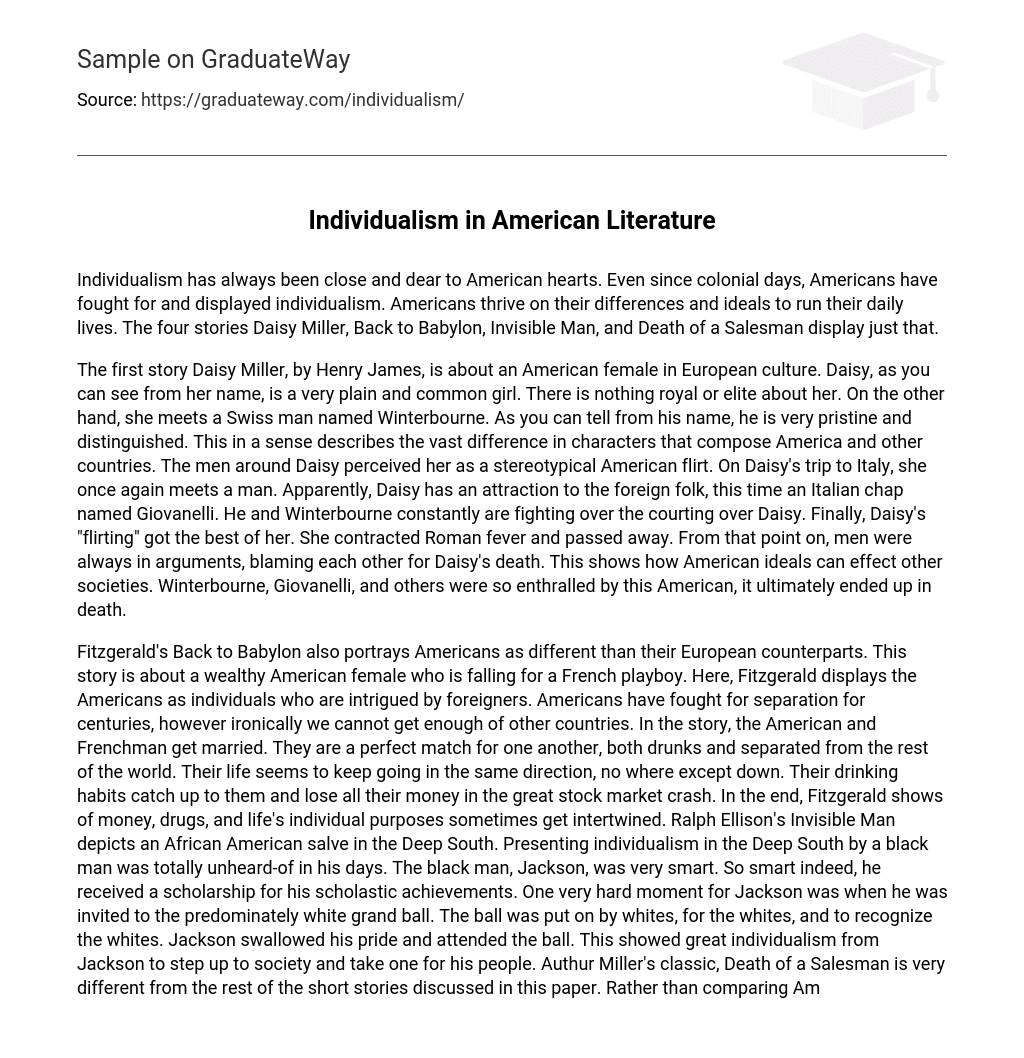The text emphasizes the enduring value of individualism in America since colonial times. Americans have consistently embraced and celebrated their unique qualities and beliefs in shaping their everyday lives. This sentiment is exemplified in the four stories: Daisy Miller, Back to Babylon, Invisible Man, and Death of a Salesman.
The first story, Daisy Miller, written by Henry James, explores the interactions between an American woman and European culture. Despite her plain and common name, Daisy stands out in contrast to the Swiss man she meets, Winterbourne, whose name reflects his pristine and distinguished nature. This juxtaposition highlights the differences between American and other nationalities. Daisy is seen by the men around her as a stereotypical American flirt. During her trip to Italy, she becomes involved with an Italian man named Giovanelli, causing rivalry between him and Winterbourne in courting Daisy. Tragically, Daisy’s flirtatious behavior leads to her contracting Roman fever and eventually dying. This event causes conflict among the men as they blame each other for her demise, illuminating the impact of American ideals on other societies. In the end, Winterbourne, Giovanelli, and others are captivated by this American woman with fatal consequences.
Fitzgerald’s “Back to Babylon” highlights the contrasting nature of Americans compared to Europeans through its portrayal of a wealthy American woman who becomes infatuated with a French playboy. The story portrays Americans as individuals who are fascinated by foreign cultures, despite their long history of seeking independence. In the narrative, the American and Frenchman eventually marry, united by their shared love for alcohol and their detachment from the wider world. Their lives seem to spiral downward, but their downfall is ultimately attributed to their excessive drinking and financial losses during the stock market crash. Fitzgerald ultimately suggests that the pursuit of wealth, substance abuse, and personal ambitions can become entangled.
Ralph Ellison’s “Invisible Man” presents the story of a highly intelligent African American man living in the racially segregated Deep South. Ellison’s depiction of individualism in such a region, particularly by a black man, was unprecedented at the time. The protagonist, Jackson, earns a scholarship due to his exceptional academic achievements. One significant challenge he faces is when he is invited to attend a prestigious white grand ball, an event organized by and for white individuals to celebrate their own achievements. Despite the implications and potential humiliation, Jackson swallows his pride and attends, demonstrating remarkable personal bravery and individualism as he confronts societal expectations on behalf of his own community.Authur Miller’s iconic play, Death of a Salesman, stands out from the other short stories discussed in this paper due to its unique approach. Instead of comparing Americans to each other, Miller contrasts one individual across different time periods. Willie Loaman, a struggling salesman in Brooklyn nearing the end of his career, grapples with the harshness of reality and the realization that his time has passed. The presence of Individualism requires a person to possess strong determination and self-reliance, qualities Willie has demonstrated throughout his life. However, he currently lives vicariously through his two sons and frequently reminisces about better times. Willie is an incredibly proud person, often boasting about his weekly earnings and his ability to sell a refrigerator to an Eskimo. He holds these accomplishments close to his heart and refuses to let go. This level of steadfastness speaks volumes about Willie’s strength as an individual.
From the four stories – Daisy Miller, Back to Babylon, Invisible Man, and Death of a Salesman – it can be observed that Individualism can be portrayed and analyzed in various ways. It can be characterized as internal or external, personal or societal. Americans, without a doubt, are a distinct group. They stand out in expressing and valuing their differences. Individualism is one of the few characteristics that Americans can truly claim as their own. Bibliography:





